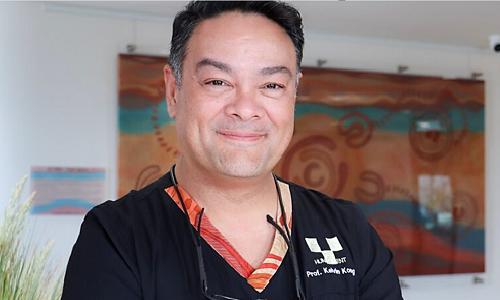Professor Kelvin Kong, a prominent otolaryngology, head and neck surgeon, believes the majority of Australians would vote Yes to the Voice to Parliament if given the right information, and that the medical community has a role to play.
Professor Kelvin Kong is a Worimi man, working on Awabakal and Worimi Country at Newcastle’s John Hunter Hospital and John Hunter Children’s Hospital. Professor Kong is an otolaryngology, head and neck surgeon and a Fellow of the Royal Australasian College of Surgeons.
Earlier this year, Professor Kong was named NAIDOC Person of the Year for his work with Indigenous children at risk of hearing loss due to otitis media.
“Unfortunately, Australia still has the worst ear disease rates in the world,” Professor Kong said. “Chronic suppurative otitis media affects from 40% to 85% of children in Indigenous communities. It is disheartening discussing my mob on an international scale because of the dichotomy that exists with ear disease here.
“Every kid endures otitis media at some point in their life. Most get it at around two years of age. In our population, we’ve seen it occur in under-12-months. The big difference is whether you identify the issue early and whether you get access to the help required.”
Creating equitable access
“How do we make sure that a child can navigate the health system in a safe and timely way?” Professor Kong asked.
“It’s often related to both social and cultural determinants of health. The issues are around access, and there are multiple phases.
“Firstly, we need to increase the awareness for parents, that there’s something here that is easily fixed.”
The stripping away of resources in primary health care and Indigenous Health Practitioners must also be stopped, Professor Kong said.
“And we really need to look after our GP specialists.
“They [all] play such an important role, yet by eroding the resources available for primary health care we devalue their role in our health paradigm.
“We should also acknowledge the significant contributions made by Aboriginal Community Controlled health organisations, and private primary health care providers, in improving accessibility and enhancing health care.”
The third aspect pertains to the presence of racism or explicit barriers that hinder individuals from accessing these services, Professor Kong said, who added that these issues are not always easy to understand for a non-Indigenous perspective.
“We often ignore the role of racism in health outcomes. Living life as an Indigenous person can be traumatic from the day you’re born.
“From the events which you see and the way in which your family are treated.
“Eliminating racism in health is paramount because [it] leads to reduced trust in health care systems in vulnerable communities, which perpetuates health disparities.”
Equity and equality.
Professor Kong also highlighted the difference between equity and equality.
“The nuance is important,” he said.
“You can’t say to everyone, ‘Here’s a hospital — come to the hospital’. We need to make sure we’re running different programs to make sure that the right people are getting care.
“When we visit hospitals, we’re treated differently. People look at and think about us differently. Even when we’re doing positive things.
“For example, the lateral violence I have experienced as a surgeon is quite confronting. But I’m Professor of Surgery, I’m able to confront that, whereas a lot of the community wouldn’t have that ability. And so, they regress and absorb more anguish.”
He also highlighted the importance of creating a culturally safe space.
“A simple example is one of my clinics,” he said.
“At the hospital, we had a huge DNA/FTA (did/fail not attend) rate. We moved the [ear, nose and throat] clinic to the local Aboriginal Medical Services, and rather than report on DNA rate, we had 150% turn up rate.
It wasn’t about geographic distance.
“It was purely about having a culturally safe space, where families and communities feel safe.”
“And so, by trying to change a paradigm and try and break down some of those barriers, we can open the doors and support the practitioners and primary health care physicians in this space.”
The Royal Australian College of Surgeons and advocacy for patient safety.
Professor Kong says the Royal Australian College of Surgeons has had a significant role in promoting social health, and its role in promoting the Voice to Parliament is no different.
“The College of Surgeons were the forebears of the seatbelt wearing era,” he said.
“At the time people were saying, ‘If people are silly enough to have a crash, it’s their own fault’. It was legislated, and it saved so many lives.
“As a medical organisation, and through the Australian Medical Association as well, it is within our remit and mandate to make sure we make the community safe for our patients.”
He said the most important thing he kept coming back to was the need for a respectful conversation.
“We can bring a whole segment of society that we’ve excluded back into line; that’s exciting for us as a country,” Professor Kong said.
From MJA Insight+

